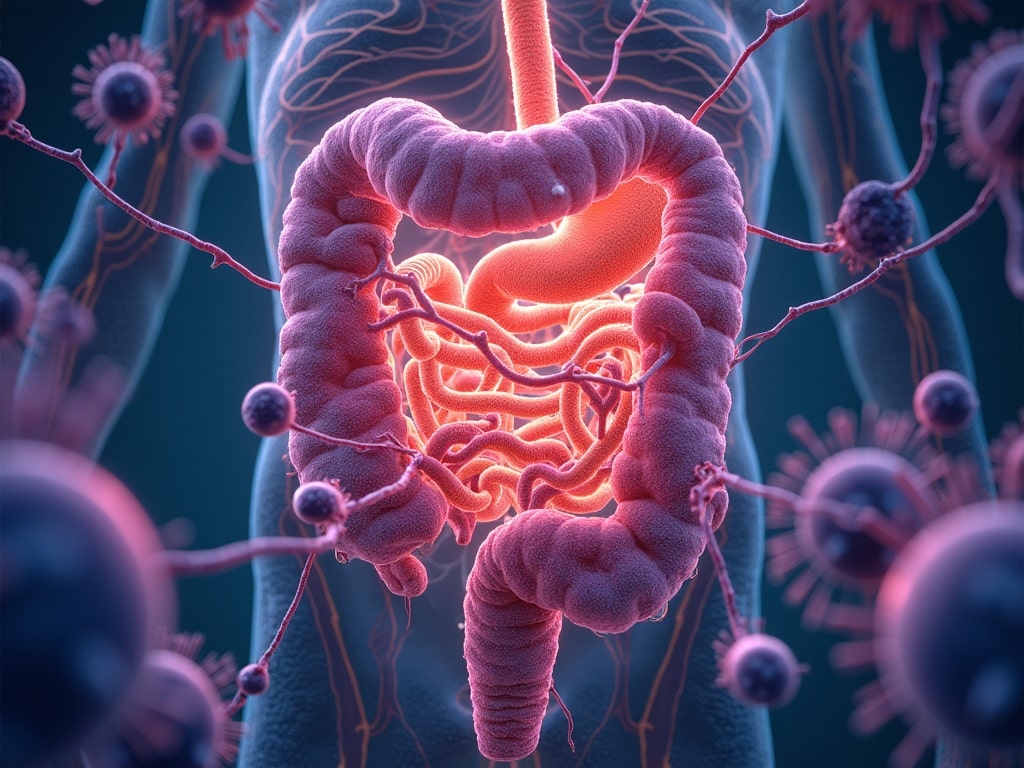The Unseen Link: How Gut Health Holds the Key to Weight Loss
Imagine your gut as a bustling metropolis, teeming with trillions of microscopic residents. These are your gut bacteria, collectively known as your gut microbiome. They're not just passive inhabitants; they're active participants in your body's processes, influencing everything from your mood and immune system to, surprisingly, your weight. For years, weight loss has been primarily associated with calorie counting and intense exercise. But what if a crucial piece of the puzzle has been missing? What if the key to unlocking sustainable weight loss lies within the complex ecosystem of your gut?
The Gut Microbiome: A Tiny World with a Big Impact
The gut microbiome is a complex community of bacteria, fungi, viruses, and other microorganisms residing in your digestive tract. It's unique to each individual, like a fingerprint, shaped by factors like genetics, diet, and environment. A healthy gut microbiome is diverse, meaning it contains a wide variety of beneficial bacteria. These bacteria play vital roles in:
- Digesting food: They help break down complex carbohydrates and fibers that your body can't digest on its own, extracting energy and nutrients.
- Synthesizing vitamins: Certain gut bacteria produce essential vitamins like vitamin K and some B vitamins.
- Strengthening the immune system: A significant portion of your immune system resides in your gut, and the microbiome helps train and regulate it.
- Protecting against pathogens: Beneficial bacteria compete with harmful bacteria, preventing them from colonizing and causing infections.
- Regulating inflammation: The gut microbiome influences inflammation levels throughout the body.
However, an imbalance in the gut microbiome, known as dysbiosis, can disrupt these processes and contribute to various health problems, including weight gain and difficulty losing weight.
Dysbiosis: When the Gut Goes Rogue
Dysbiosis occurs when the balance of bacteria in your gut shifts, with harmful bacteria outnumbering the beneficial ones. This imbalance can be triggered by factors such as:
- A diet high in processed foods, sugar, and unhealthy fats: These foods feed harmful bacteria, promoting their growth while starving beneficial bacteria.
- Antibiotics: While antibiotics are essential for treating bacterial infections, they can also wipe out beneficial bacteria in the gut, leading to dysbiosis.
- Chronic stress: Stress can negatively impact the gut microbiome, reducing diversity and promoting inflammation.
- Lack of sleep: Sleep deprivation can disrupt the gut microbiome and contribute to dysbiosis.
- Environmental toxins: Exposure to environmental toxins like pesticides and pollutants can negatively affect the gut microbiome.
When dysbiosis occurs, it can have a cascade of negative effects on your body, making weight loss more challenging.
The Gut-Weight Connection: Unraveling the Mechanisms
So, how exactly does an imbalanced gut microbiome contribute to weight gain and hinder weight loss efforts? Here are several key mechanisms:
1. Increased Calorie Absorption
Certain types of gut bacteria are more efficient at extracting calories from food than others. When the gut microbiome is dominated by these calorie-harvesting bacteria, you may absorb more calories from the same amount of food, leading to weight gain. Furthermore, dysbiosis can impair the gut's ability to regulate fat storage. This means your body may store more calories as fat rather than using them for energy.
2. Inflammation and Insulin Resistance
Dysbiosis can trigger chronic low-grade inflammation throughout the body. This inflammation can interfere with insulin signaling, leading to insulin resistance. Insulin resistance means your cells become less responsive to insulin, a hormone that helps glucose (sugar) enter cells for energy. As a result, glucose builds up in the bloodstream, leading to elevated blood sugar levels and potentially, type 2 diabetes. Insulin resistance also promotes fat storage, particularly around the abdomen, making it harder to lose weight.
3. Hormonal Imbalances
The gut microbiome plays a role in regulating hormones that control appetite and satiety, such as leptin and ghrelin. Leptin signals fullness to the brain, while ghrelin stimulates appetite. Dysbiosis can disrupt the production and signaling of these hormones, leading to increased appetite, cravings, and overeating. This can create a vicious cycle, where overeating further exacerbates dysbiosis.
4. Impact on Metabolism
The gut microbiome influences your metabolism, the process by which your body converts food into energy. Certain gut bacteria produce short-chain fatty acids (SCFAs) like butyrate, acetate, and propionate. These SCFAs have various beneficial effects, including providing energy to gut cells, reducing inflammation, and improving insulin sensitivity. Dysbiosis can reduce the production of SCFAs, impairing metabolic function and contributing to weight gain. Additionally, the gut microbiome influences the production of bile acids, which are essential for fat digestion and absorption. Dysbiosis can disrupt bile acid metabolism, leading to impaired fat digestion and potentially, weight gain.

Strategies for Improving Gut Health and Supporting Weight Loss
The good news is that you can take steps to improve your gut health and support your weight loss efforts. Here are some evidence-based strategies:
1. Embrace a Diverse, Plant-Based Diet
Focus on eating a wide variety of whole, unprocessed foods, especially fruits, vegetables, and whole grains. These foods are rich in fiber, which feeds beneficial gut bacteria. Aim to include a rainbow of colorful fruits and vegetables in your diet, as each color represents different beneficial compounds that support gut health. Limit your intake of processed foods, sugar, and unhealthy fats, as these can promote the growth of harmful bacteria.
2. Prioritize Fiber Intake
Fiber is a prebiotic, meaning it acts as food for beneficial gut bacteria. Aim for at least 25-30 grams of fiber per day from sources like fruits, vegetables, whole grains, legumes, nuts, and seeds. Gradually increase your fiber intake to avoid digestive discomfort. Consider incorporating prebiotic-rich foods like garlic, onions, leeks, asparagus, and bananas into your diet.
3. Incorporate Fermented Foods
Fermented foods like yogurt, kefir, sauerkraut, kimchi, and kombucha are rich in probiotics, live microorganisms that can benefit your gut health. Choose yogurt and kefir with live and active cultures. Start with small servings of fermented foods and gradually increase your intake to avoid digestive upset. Be mindful of added sugar content, especially in commercially produced yogurt and kombucha.
4. Consider a Probiotic Supplement
If you're struggling to get enough probiotics from food alone, consider taking a probiotic supplement. Choose a high-quality probiotic supplement that contains a variety of beneficial bacterial strains. Look for supplements with CFU (colony-forming units) in the billions. Consult with a healthcare professional to determine the best probiotic supplement for your individual needs.
5. Manage Stress Levels
Chronic stress can negatively impact the gut microbiome. Practice stress-reducing techniques like yoga, meditation, deep breathing exercises, or spending time in nature. Prioritize self-care activities that help you relax and unwind. Consider seeking professional help if you're struggling to manage stress on your own.
6. Prioritize Sleep
Aim for 7-9 hours of quality sleep per night. Establish a regular sleep schedule, going to bed and waking up around the same time each day. Create a relaxing bedtime routine to help you wind down before sleep. Ensure your bedroom is dark, quiet, and cool.
7. Limit Antibiotic Use
Antibiotics can disrupt the gut microbiome, so use them only when necessary and as prescribed by a doctor. Discuss alternative treatment options with your doctor if possible. If you need to take antibiotics, consider taking a probiotic supplement during and after the course to help replenish beneficial gut bacteria.
Beyond the Scale: Other Benefits of a Healthy Gut
While improving gut health can support weight loss, it also offers a multitude of other benefits, including:
- Improved digestion: A healthy gut microbiome can improve digestion, reduce bloating, and alleviate constipation.
- Enhanced immunity: A balanced gut microbiome can strengthen your immune system and protect you from infections.
- Reduced inflammation: A healthy gut can reduce chronic inflammation throughout the body, lowering your risk of various diseases.
- Improved mood and brain function: The gut microbiome communicates with the brain through the gut-brain axis, influencing mood, cognition, and mental health.
- Increased energy levels: A healthy gut can improve nutrient absorption, leading to increased energy levels.
The Takeaway: Nurture Your Gut, Transform Your Health
The connection between gut health and weight loss is undeniable. By nurturing your gut microbiome, you can unlock a powerful tool for achieving sustainable weight loss and improving your overall health and well-being. Focus on nourishing your gut with a diverse, plant-based diet, managing stress, prioritizing sleep, and limiting exposure to harmful substances. Remember, a healthy gut is not just about weight loss; it's about creating a foundation for a vibrant and thriving life.

